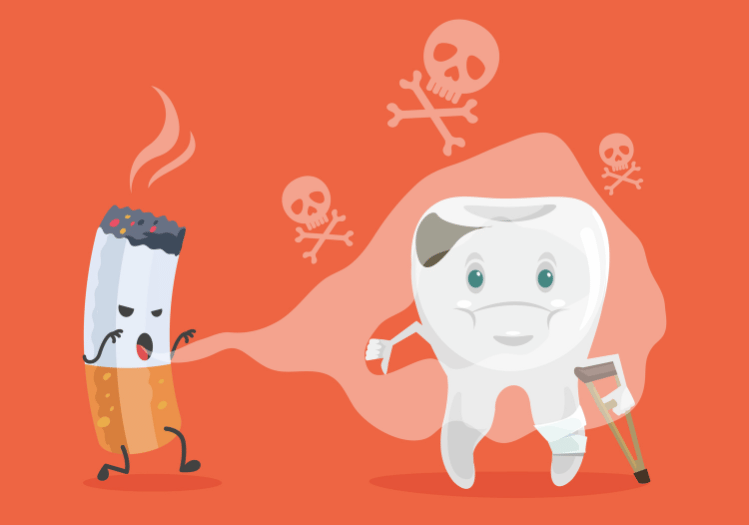
Smoking and vaping have become increasingly popular habits in recent years, especially among young adults. While the dangers of smoking and vaping on overall health are well-known, many people are unaware of the harmful effects these habits can have on oral health. In this blog, we'll explore the impact of smoking and vaping on your oral health and why quitting these habits is crucial for maintaining a healthy mouth.
Smoking and Oral Health
Smoking is a significant risk factor for numerous oral health problems, including tooth decay, gum disease, tooth loss, and oral cancer. When you smoke, the chemicals and toxins in cigarettes can damage your teeth and gums in several ways:
- Staining: Nicotine and tar in cigarettes can cause teeth to yellow and become discolored over time.
- Bad breath: Smoking can lead to chronic bad breath due to the accumulation of bacteria and toxins in the mouth.
- Gum disease: Smoking can increase the risk of gum disease by interfering with the immune system's ability to fight off infection.
- Tooth decay: Smoking can lead to the buildup of plaque and tartar on teeth, which can cause cavities and decay.
- Oral cancer: Smoking is the leading cause of oral cancer, which can be fatal if not detected early.
Vaping and Oral Health
Vaping, which involves inhaling aerosols or vapors produced by electronic cigarettes, is often marketed as a safer alternative to smoking. However, research shows that vaping can also have harmful effects on oral health:
- Dry mouth: Vaping can cause dry mouth, which can increase the risk of tooth decay and gum disease.
- Gum irritation: The chemicals and flavorings in e-cigarettes can irritate the gums and cause inflammation.
- Oral cancer: While the long-term effects of vaping on oral cancer are still unknown, some studies have shown that e-cigarette vapors can contain carcinogenic chemicals that may increase the risk of cancer.
Why you should quit
If you smoke or vape, quitting is the best thing you can do for your oral health. Not only will quitting reduce your risk of developing oral health problems, but it can also improve the health of your teeth and gums. Here are some of the benefits of quitting smoking and vaping:
- Improved breath: Quitting smoking or vaping can help eliminate chronic bad breath. Whiter teeth: Quitting smoking can reduce staining and discoloration on your teeth, giving you a brighter, whiter smile.
- Healthier gums: Quitting smoking or vaping can help reduce the risk of gum disease and improve the health of your gums.
- Reduced risk of oral cancer: Quitting smoking or vaping can significantly reduce your risk of developing oral cancer.
- Improved overall health: Quitting smoking or vaping can also improve your overall health by reducing the risk of lung disease, heart disease, and other health problems associated with smoking.
Can ALIGNERCO Help You In Breaking The Habit Of Smoking?
While aligners are primarily used to straighten teeth and correct bite issues, some studies suggest that they may help break the habit of smoking.
One reason aligners may help is that they create a barrier between the teeth and the lips, which can make it more challenging to hold a cigarette in the mouth. This physical barrier can act as a reminder to avoid smoking, as it may feel uncomfortable or awkward to smoke while wearing aligners. Additionally, aligners are usually worn for at least 20 hours a day, so smokers may be more likely to avoid smoking to prevent staining or discoloration of their aligners.
Moreover ALIGNERCO treatment comes with specific guidelines to avoid smoking during the treatment. ALIGNERCO aligners are made of clear plastic, and smoking can cause the aligners to become discolored, which can affect the overall appearance of the treatment.
However, it's essential to note that aligners alone are not a magic solution to quit smoking. Breaking the habit of smoking requires commitment, motivation, and lifestyle changes.
Conclusion
In conclusion, smoking and vaping can have significant negative impacts on your oral health. Quitting these habits is essential for maintaining a healthy mouth and reducing the risk of oral health problems, including gum disease, tooth decay, and oral cancer. If you're a smoker and looking to quit, seeking support from friends, family, or a healthcare professional can be helpful. Additionally, there are many resources available, such as counseling, nicotine replacement therapy, and support groups that can aid in quitting smoking.
FAQs
Can smoking cause gum disease?
Yes, smoking is a significant risk factor for gum disease. Smoking can damage the immune system, making it harder for the body to fight off infections, including gum disease. Smoking can also cause inflammation in the gums, leading to a higher risk of gum disease.
How can vaping affect my teeth and gums?
Vaping can cause dry mouth, which can increase the risk of tooth decay and gum disease. The chemicals and flavorings in e-cigarettes can also irritate the gums and cause inflammation.
Can smoking or vaping cause oral cancer?
Yes, smoking and vaping can both increase the risk of developing oral cancer. Smoking is the leading cause of oral cancer, while the long-term effects of vaping on oral cancer are still unknown.
How can I quit smoking or vaping?
There are many resources available to help you quit smoking or vaping. You can talk to your dentist or doctor about resources and support available, such as counseling, nicotine replacement therapy, and support groups. Additionally, lifestyle changes, such as exercise, healthy eating, and stress management, can also be helpful in quitting smoking or vaping.

